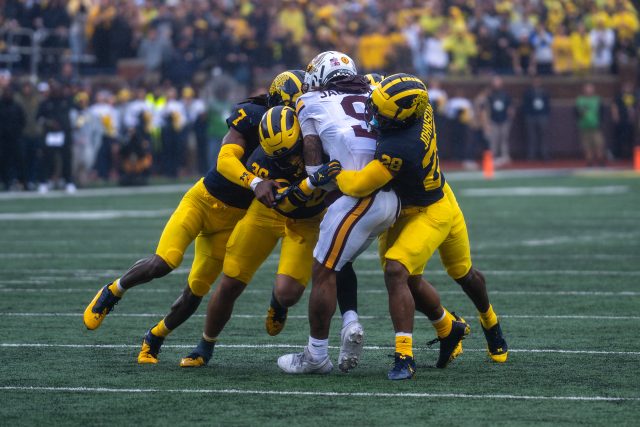[ad_1]
The No. 24 Michigan football team’s secondary has a lot of weight on its shoulders. The Wolverines’ defensive backs play behind a dominant front seven that has held opponents to just 76 rushing yards per game, so teams know that to beat Michigan, they have to throw the ball.
Thus far, the secondary hasn’t been up to the task. In losses to Washington and Texas, it allowed a combined 561 passing yards and five touchdown passes. And in their four games against Power Four competition, the Wolverines have allowed nearly 11 yards per completion.
When Michigan’s opponents complete a pass, it often goes for a big gain. So if the secondary wants to improve, it knows the biggest area where it can take the next step.
“It’s too many explosives,” graduate defensive back Quinten Johnson said Tuesday while shaking his head. “That’s something that we’ve been focusing all week trying to address, trying to limit. It starts from the top up and it’s our job, especially as the older guys in the secondary, to address and fix.”
Those explosive plays were especially damning against the Huskies, as the Wolverines allowed nine passing plays of 15 yards or more, heavily contributing to the loss. And while Saturday in Seattle provided the worst example of it for Michigan thus far, it was just the latest entry in a growing trend of giving up big yardage through the air.
Johnson says that the older guys in the room need to address the problem, but the Wolverines rely on a lot of youth in the secondary. Sophomore cornerback Jyaire Hill and junior cornerback Zeke Berry are both in their first seasons starting, and have commanded the majority of snaps as the number two and nickel cornerback, respectively. Both have shown flashes throughout the season, but they’ve also experienced expected growing pains.
It also doesn’t help that Michigan’s secondary is thoroughly banged up. Four defensive backs were listed as out on Saturday, and two more were questionable ahead of the game. Already missing one of its greatest talents in senior safety Rod Moore, the continued pile-up of injuries has stretched the Wolverines even thinner.
“(Moore) makes sure that he leads by example, even if it’s not on the field,” Johnson said. “… But on the field, definitely any guy with that amount of talent, when you don’t have him in the roster on Saturdays you’re going to miss that.”
While Moore isn’t coming back anytime soon, the current bye week should help some of Michigan’s defensive backs get healthier. Growing pains are also called growing pains for a reason, and Hill and Berry both will likely continue to improve. But given the number of explosive plays that the Wolverines have allowed in the first half of the season, they’ll need a quicker fix than that.
A lot of that can come from fixing their tackling issues. Many of the explosive plays they’ve allowed are simply due to blown coverages or missed assignments, but a sizable portion come from failing to bring down opposing ball carriers. Improve the tackling, and Michigan might find that some of those explosive plays start to fizzle out.
“A lot of explosives are broken plays where guys miss tackles,” Johnson said. “Stuff like that, that’s all leverage. So, (I) wouldn’t necessarily compare it to years back, but it’s missed tackles. Missed tackles are caused by bad angles and bad leverage.”
Taking better angles and getting better leverage won’t fix the Wolverines’ explosive play problem entirely, but it can prevent opponents from taking nothing and turning it into something. And with those opponents already angling to attack Michigan’s secondary, any place where the Wolverines’ defensive backs can improve will help the defense as a whole take a necessary step forward.
Related articles
[ad_2]
Source link











